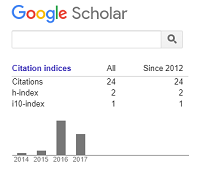Karakter Jujur Dalam Pembelajaran Statistik
DOI:
https://doi.org/10.18592/jpm.v1i2.46Keywords:
Honest Character, Statistic, LearningAbstract
Associated with the philosophy of education, values education goal is to humanize humans, develop human resources and form a perfect human being. Educational value must appear in every process of learning, including learning of mathematics that had only mastery of math-oriented course. Brameld (1975) said that as the education of power that emphasizes the importance of education for the development of value systems so that learners able to think, act. Conversely, when the focus of mathematics learning material substance, then the learning process in favor of knowledge of power. Learning of mathematics as it has the potential to bear the arrogance of science and widened the gap between the intellectual and moral. Mathematics teachers should be held to consider the characteristics of students who learn mathematics and the mathematics itself. Learning math has been less attention to the both characteristics, and more inclined to the same learning patterns, which describe in brief, give examples, exercises, and giving a homework assignment.Ideally, the learning of statistic should develop the cognitive, affective and psychomotor as an essential component. Development of values and ethics in mathematics inappropriate if only positioned as a crucial component or the hidden curriculum (hidden curriculum). Values, morals and ethics should be explicit translated and enriched in every topic of learning. Through such learning, the balance between the ownership of knowledge, technological competence, moral individual and an appreciation of social values and culture can be improved.Conclusion: (1) currently Learning statistic is as academic, but statistic has honest value as build the honest character personality; (2) ideally statistic learning have to develop cognitive, affective, and psycomotorist as essential component; (3) developing values, moral, and ethic on statitistic learning unexactly whether crucial component, because values, moral, and ethic expose and enrich to each learning.References
Al-Hasyimi, M.A. (2006). Kepribadian Seorang Muslim. Riyadh: IIPH
Alisah,E. & Dharmawan, P.E. (2007). Filsafat Dunia Matematika. Pengantar untuk Memahami Konsep-konsep Matematika. Jakarta. Prestasi Pustaka.
Amril,M. (2005). Etika dan Pendidikan.Yogyakarta. Aditya Media, dan Pekanbaru:LSFK2P.
Bertens, K. (1994). Etika. Jakarta: Gramedia Pustaka Umum.
Departemen Pendidikan Nasional (2006). Kurikulum Tingkat Satuan Pendidikan. Jakarta: Depdiknas.
Departemen Pendidikan Nasional (2007). Peraturan Menteri Pendidikan Nasional
Republik Indonesia No.41 Tahun 2007 tentang Standar Proses untuk Satuan
Pendidikan Dasar dan Menengah. Tersedia: http://www.bnsp-indonesia.org/ standar-proses.php.
Djahiri, Kosasih. (1996). Menelusuri Dunia Afektif untuk Moral dan Pendidikan Nilai Moral. Bandung:LPPMP.
Eck, Marcel. (1970). Lies & Truth. New York: Macmillan.
Elias, J.J. (1989). Moral Education: Secular and religious. Florida: Robert E. Krieger Publishing Co., Inc.
Elmubarok, Z. (2007). Membumikan Pendidikan Nilai. Bandung: Alfabeta.
Furqon. (1999). Statistika Terapan untuk Penelitian. Bandung: Alfabeta.
Hudojo, H. (1988). Mengajar Belajar Matematika. Jakarta: Dirjen Dikti Depdibud.
Joyce, Bruce & Weil, Marsha. (1980). Models of Teaching. New Jersey: John Wiley.
Koentjaraningrat. (1990). Pengantar Ilmu Antropologi. Jakarta: Rineka Cipta.
Lickona, T. (1992). Educating for Character. New York: Bantam Books
Mason, J dkk. (1985). Thinking Mathematically. England: Pearson Education.
Megawangi. (2004). Pendidikan Karakter. Jakarta: BPMIGAS.
Muhsetyo, Gatot dkk. (2008). Pembelajaran Matematika SD. Jakarta: Universitas Terbuka.
Phenix. (1964). Realms of Meaning. New York: Mc Graw-Hill
Soedjadi, R. (2000). Kiat Pendidikan Matematika di Indonesia (Konstatasi keadaan masa kini menuju harapan masa depan). Jakarta. Dirjen Dikti Depdiknas.
Sugiyono. (2009). Statistika untuk Penelitian. Bandung: Alfabeta.
Sujono. (1988). Pengajaran Matematika untuk Sekolah Menengah. Jakarta: Ditjen Dikti.
Sumaatmadja, N. (2002). Pendidikan Pemanusiaan Manusia Manusiawi. Bandung: CV Alfabeta.
Sumanto, dkk. (2008). Gemar Matematika 6: untuk Kelas VI SD/MI. Jakarta: Pusat Perbukuan.





